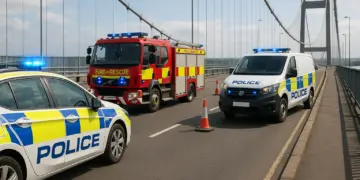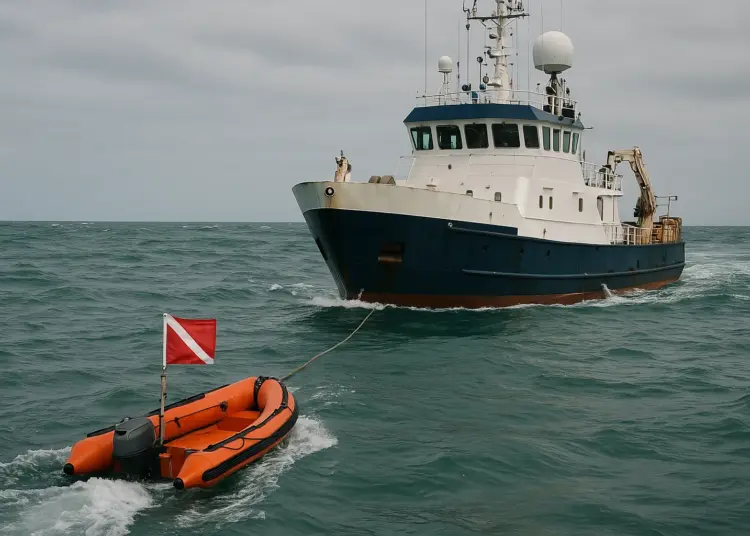Story Highlight
– Insufficient lookout on support vessel identified.
– Vessel fatally struck recreational diver.
– Diver was exploring German battleship wreck.
– Investigation revealed safety oversights.
– Incident highlights need for better maritime safety.
Full Story
The recent investigation into a tragic maritime incident has revealed critical shortcomings in the lookout protocols aboard a support vessel that collided with a diver exploring a historic wreck. The incident, which resulted in the death of a recreational adventurer named Paul, has raised questions about safety measures during underwater expeditions.
According to the findings presented in the official report, the support vessel lacked adequate lookout arrangements at the time of the accident, which ultimately led to the collision. The diver had been engaged in exploration activities surrounding the wreck of a German battleship when he was struck. The investigation highlighted that proper lookout practices are essential to ensuring the safety of all individuals participating in such activities, particularly in busy maritime environments.
Eyewitness accounts and data collected during the investigation painted a complex picture of the circumstances leading up to the incident. Evidence suggested that the support vessel was operating under conditions that required heightened vigilance. Expert analysis indicated that the absence of sufficient lookout personnel may have contributed to the failure to identify the presence of the diver in the water, which ultimately resulted in the tragic accident.
The maritime industry is under scrutiny following the report, as authorities call for a reassessment of existing safety protocols. Commenting on the findings, marine safety expert Dr. Isabella Henderson noted, “This incident underscores the vital importance of maintaining rigorous lookout protocols, particularly when operating in areas where recreational diving occurs. It is imperative that all vessels ensure they have adequate manpower and systems in place to monitor the waters they navigate.”
The local community has expressed its outrage and sorrow in the wake of the investigation’s findings. Friends and family of the diver identified as Paul described him as an experienced and passionate explorer who had a deep love for maritime history. Helen Cook, a close friend, stated, “Paul was always cautious and responsible. He would never have taken unnecessary risks. This tragedy has left a significant void in our lives.”
In response to the investigation, regulatory authorities are beginning to re-evaluate existing guidelines concerning support vessels operating around diving sites. They are particularly focused on ensuring that lookout requirements are strict and effectively enforced. Local diving clubs have also expressed their commitment to promoting safety through educational initiatives aimed at both divers and vessel operators.
Furthermore, expert commentators have suggested that this incident may serve as a pivotal learning opportunity for the maritime sector as a whole. “The underlying message here is that safety cannot be compromised, and vigilance must be maintained at all times,” said Captain James Thornton, a veteran maritime safety analyst. He added that this event serves as a crucial reminder of the potential dangers associated with recreational diving when combined with maritime navigation.
As investigations continue, there is an ongoing dialogue about the measures needed to prevent similar incidents in the future. The local government is now considering mandatory training sessions focused on lookout protocols for all support vessel operators involved in diving activities. This initiative aims to improve the overall safety standards across the region’s maritime operations.
In conclusion, the tragic death of Paul serves as a stark reminder of the responsibilities that come with operating vessels in proximity to diving activities. The investigation’s findings highlight the necessity for heightened safety protocols and the importance of community awareness in ensuring that recreational divers can pursue their passions without undue risk. The local community mourns the loss of a beloved individual while simultaneously advocating for better safety practices to safeguard others in future maritime explorations.























This tragic incident shows how essential a proper lookout and clear safety procedures are when supporting diving operations. Experienced divers and vessel crews rely on each other to manage risks, so responsibilities for spotting and communicating hazards must be defined and followed every time. Regulatory requirements, operator training and on board checks need to be reviewed to ensure adequate personnel and effective watchkeeping, particularly in areas where recreational and wreck diving take place. Robust incident reporting and prompt investigation can drive practical changes that prevent future fatalities and protect both divers and vessel crews.
Tragic and avoidable. Proper lookout and clear procedures are fundamental to safe operations on the water. Operators must ensure they have trained personnel dedicated to lookout duties, robust risk assessments for dive operations, and effective communication between surface vessels and divers. Regulators and industry need to act on the investigation findings to tighten standards, mandate relevant training, and enforce compliance so other families are not left grieving the same loss.
This tragic incident shows how vital it is for vessel operators to maintain a proper lookout at all times. Experienced divers and support crews rely on clear communication, adequate training and robust procedures to manage risks in crowded or complex diving sites. Regulators and operators should review watchkeeping arrangements, crew numbers and equipment to ensure boats can detect and react to divers in the water. Strengthening requirements for lookout duties, practical training and incident reporting will help prevent similar losses and honour the memory of the diver by improving safety for everyone.
This is a tragic reminder that basic safety measures must never be compromised. Adequate lookout is a fundamental duty whenever divers are in the water and should be treated as a non negotiable part of operations. Vessel operators need clear procedures, sufficient trained crew assigned to lookout duties, and effective communication and tag up processes between dive teams and bridge teams before each dive. Risk assessments must identify converging traffic and environmental factors and controls such as support boats positioned up current and dedicated visual and if needed electronic spotting should be used. Regulators and operators should review crew numbers, training standards and enforcement so that no one is put at unacceptable risk while conducting recreational or heritage dives.